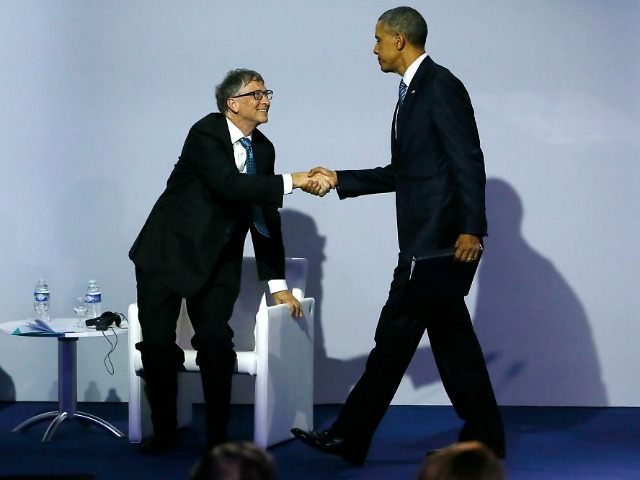Microsoft founder Bill Gates, plus a slim majority of the public, are siding with the FBI’s demand that Apple help unlock the San Bernardino jihadi’s encrypted iPhone.
“This is a specific case where the government is asking for access to information. They are not asking for some general thing, they are asking for a particular case,” Bill Gates told the Financial Times.
“It is no different than should anybody ever have been able to tell the phone company to get information, should anybody be able to get at bank records,” Gates continued. “Let’s say the bank had tied a ribbon round the disk drive and said, ‘Don’t make me cut this ribbon because you’ll make me cut it many times.'”
Apple’s defenders — a cohort that includes most of the rest of the tech industry, as the Financial Times observes, including the Reform Government Surveillance group Microsoft belongs to — would argue Gates is oversimplifying the issue, especially with his hypothetical of a bank tying a ribbon around a hard drive.
Apple says the government is demanding they write a special hackable version of the iPhone operating system, with the normal built-in defense against password-guessing disabled.
Gates took the debate to the next level and declared himself broadly in favor of requiring tech companies to give governments the back-door access to encryption they’ve been demanding.
“I hope that we have that debate so that the safeguards are built and so people do not opt – and this will be country by country – [to say] it is better that the government does not have access to any information,” he said, according to the Financial Times.
However, Gates declared himself displeased with the Financial Times interview, or at least the headline they chose for it, in a subsequent interview with Bloomberg, according to CNN. In this interview, Gates qualified his support for the government by speaking vaguely of the need to balance security and privacy rights.
“I do believe there are sets of safeguards where the government shouldn’t have to be completely blind. But striking that balance… clearly the government has taken information historically and used it in ways we didn’t expect, going all the way back to say the FBI under J. Edgar Hoover,” said Gates.
That’s not exactly a ringing endorsement for the Bureau’s information request, although Gates didn’t back away from his earlier position entirely. He said people shouldn’t judge too hastily after stories of government abuse, or after terrorist attacks.
The FT headline Gates objected to was originally “Bill Gates Backs FBI iPhone Hack Request,” but that doesn’t seem unfair — he did clearly state the request from law enforcement was reasonable. The Financial Times headline currently reads, “Gates Breaks Ranks Over FBI Apple Request,” which could be taken as mild sarcasm — it’s not really clear what the Microsoft founder supports, but he’s clearly broken ranks with Silicon Valley, which largely supports Apple’s adamant refusal to create the desired back door.
CNN further reports Gates sat for an interview with Fareed Zakaria in which he predicted Apple would ultimately agree to the FBI’s request.
Both Gates and FBI Director James Comey have claimed the case of San Bernardino killer Syed Farook’s iPhone is unique, and the government is not asking for a “skeleton key” it could use to unlock other phones… a talking point stretched to the breaking point by a report at The Verge noting at least 12 more encrypted Apple devices currently subject to court orders by the FBI, and Manhattan’s District Attorney saying he has 175 devices awaiting decryption.
The Verge suggests the government is shopping for a high-profile case it could use to break down the resistance of tech companies to decryption, establishing a precedent it can revisit in the future:
With these cases already ongoing, it would be straightforward to compel Apple’s assistance in these additional cases after the legal precedent has been set. It’s unclear why the Department of Justice chose to push forward the San Bernardino order rather than one of the other thirteen cases detailed here, although it’s likely that the high-profile nature of the case played a role in the decision.
The American people seem to be on the FBI’s side in the decryption controversy, with a new Pew Research Center poll finding 51 percent support requiring Apple to unlock the San Bernardino jihadi’s phone, while only 38 percent back Apple’s refusal to do so.
Pew notes this level of support is roughly the same between both Republicans and Democrats, while self-identified independents were more evenly split on whether Apple should unlock the phone, 45 percent to 42 percent. The strongest support for Apple, unsurprisingly, came from younger respondents and smartphone owners… although owners of Apple iPhones were actually less likely to support the company’s refusal to comply.

COMMENTS
Please let us know if you're having issues with commenting.